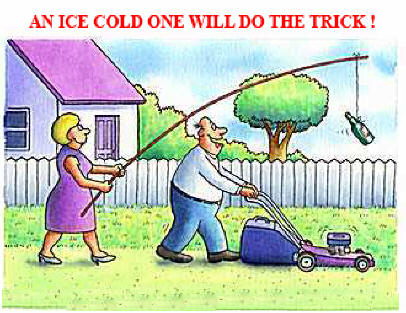 When you think of spring, you think of agreeable weather, baseball, TV season finales, and the onslaught of Wedding Season. Maybe you reminisce about your college pilgrimage(s) to Cancun, Acapulco, Cabo, or any other Mecca of Alcohol Abuse. Spring is great....except when it's followed by the word "cleaning." I hated that phrase as a kid and especially couldn't stand when people would try to put some optimistic, sing-songy tone to it. "Spring Cleaning!" No, thanks. It's one of the few things more annoying than Rick Reilly these days. (Hey Rick, here's your leather jacket, hair mousse, and water skis while you're at it.)
When you think of spring, you think of agreeable weather, baseball, TV season finales, and the onslaught of Wedding Season. Maybe you reminisce about your college pilgrimage(s) to Cancun, Acapulco, Cabo, or any other Mecca of Alcohol Abuse. Spring is great....except when it's followed by the word "cleaning." I hated that phrase as a kid and especially couldn't stand when people would try to put some optimistic, sing-songy tone to it. "Spring Cleaning!" No, thanks. It's one of the few things more annoying than Rick Reilly these days. (Hey Rick, here's your leather jacket, hair mousse, and water skis while you're at it.)The matter of spring cleaning itself is little more than a topical lede for this post. What I come to you this evening to discuss are Adult Chores in general. As kids we all did chores to gain some sort of grip on the concept of responsibility and/or the value of a dollar. That's totally fine. But when you're grown up and you work for a living, the days of tedious, laborious, mundane tasks consuming your free time should be over. It's one thing if you enjoy certain types of household work, i.e. gardening, as a hobby. It's a whole other thing if you missed seeing the #1 college football team get upset on an autumn Saturday because you were obligated to rake leaves for 3 hours.
Married guys joke about the "honey-do" list a lot. It makes me cringe. "Hey Phil, what did you do this past weekend?" "Oh, the wife put me to work, heh-heh. Spent 6 hours cleaning gutters, trimming hedges, and then she had me change her oil." It certainly sounds like our buddy Phil had a fantastic weekend, didn't he? If that becomes my life at some point, please take mercy on me, and, by "take mercy on me" I mean re-enact the last scene in One Flew Over the Cuckoo's Nest, with you being the Chief and me being R.P. McMurphy.
I'm not saying the do-it-yourself approach is bad. Hell, some things, like shoveling snow, you sometimes just have to grin and bear and take care of on your own. Other things can even be borderline-enjoyable if you've got nothing else to do and a good playlist going on the iPod (washing your car on a 75-degree day comes to mind). I'm just saying that some people end up enslaved to their chores in a blinded effort to save money. John and I have discussed this many a time, usually while enjoying an afternoon on the golf course. He came up with the great line that "what these people may save in money, they sacrifice in existence." Couldn't have said it better myself. Once again, I'm not telling you to waste money having every single little thing done for you. But, too often, people forget that money spent for the purpose of purifying one's "me time" is some of the best money one will ever spend.
Here's my whole thing. Paying what you determine to be a fair and/or nominal price to have a task done professionally for you is what America is all about. Movement of money is good for the economy, and since I value my time as much as I value my money, it's a good investment to me. I gladly fork over money to have dress clothes dry-cleaned, because I've tried ironing - and I suuuccck at it. Time not spent hunched over an ironing board muttering obscenities to myself is time spent reading, working out, watching sports, writing on this here blog, or any other desirable activity you can think of.
There are about 6 or 7 things in this world that I'm truly very good at. So if the task calls for something outside of lifting a weight, hitting a 3-iron, reciting sports trivia, or seamlessly incorporating movie and TV quotes into conversation, the chances are pretty good that I may not be the most qualified person for the job. You can call me lazy. You can call me un-handy, if that's even a word. You can pontificate on how I'm a microcosm of the outsourcing problem in America. But I make enjoyable use of my free time, and you can't take that away from me.
There are about 6 or 7 things in this world that I'm truly very good at. So if the task calls for something outside of lifting a weight, hitting a 3-iron, reciting sports trivia, or seamlessly incorporating movie and TV quotes into conversation, the chances are pretty good that I may not be the most qualified person for the job. You can call me lazy. You can call me un-handy, if that's even a word. You can pontificate on how I'm a microcosm of the outsourcing problem in America. But I make enjoyable use of my free time, and you can't take that away from me.


